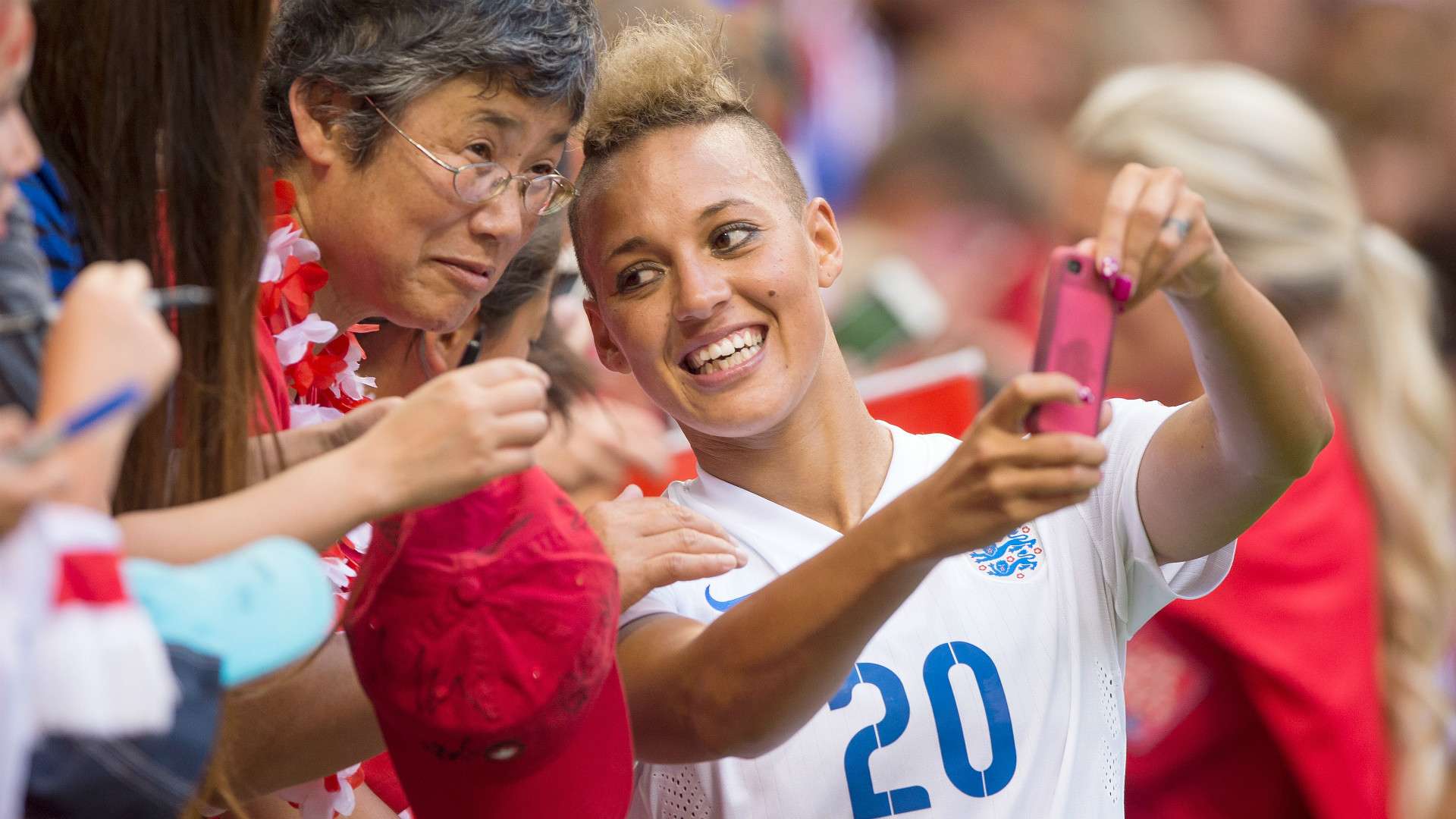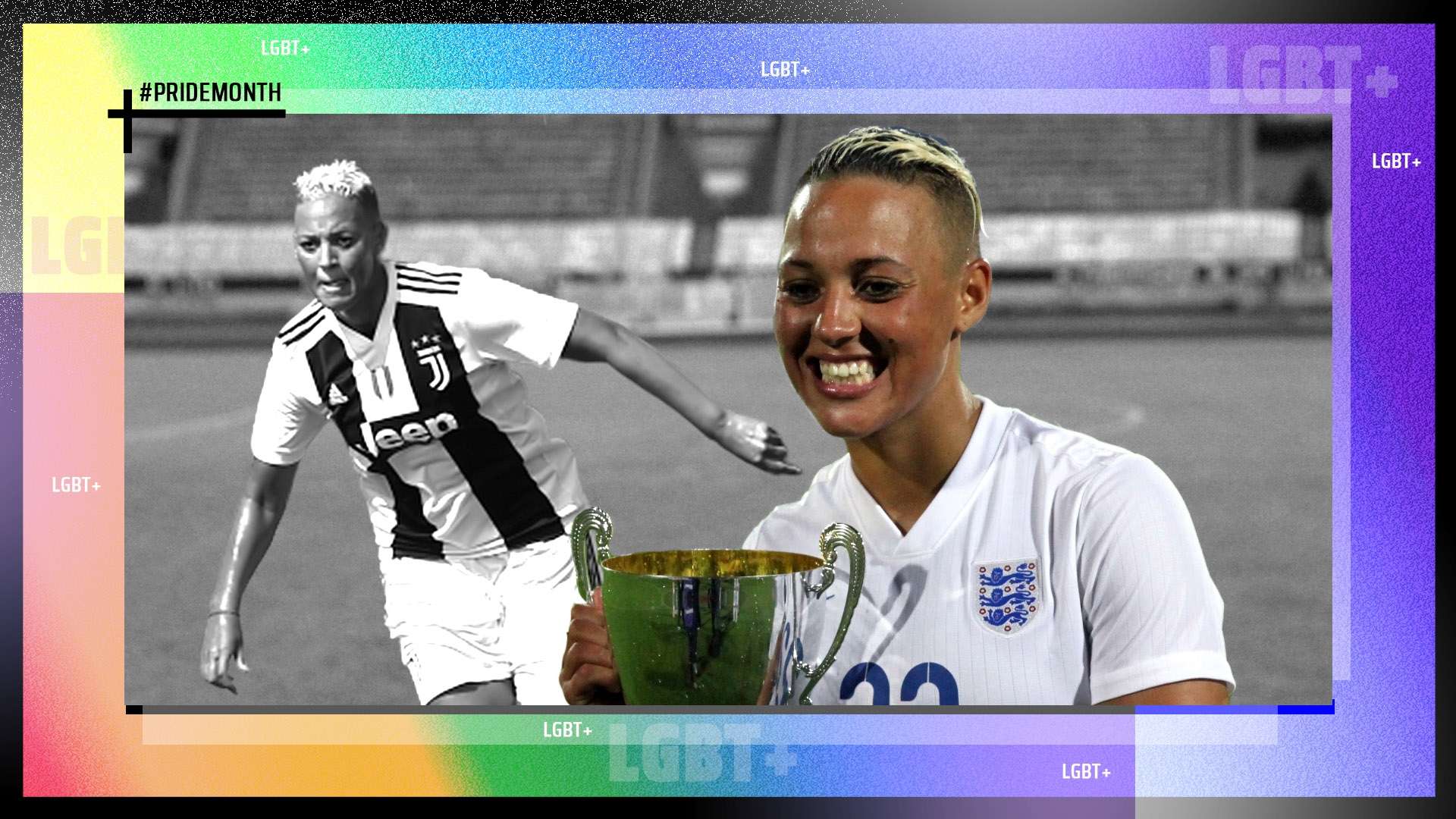Lianne Sanderson has never been a fan of stereotypes.
From her desire to become a footballer from the age of five despite there being no professional women’s game in England, to twice stepping away from representing her country amid conflicts with the management, she has always determinedly followed her own path.
Eleven years ago, Sanderson again blazed a trail when she became the first English professional footballer to come out as gay.
Now 32 and a free agent, Sanderson has enjoyed a globe-trotting career, with 50 international caps and spells in England, the United States, Spain, Cyprus, and, most recently, Italy with Juventus.
This has given her a unique perspective on how LGBT footballers are perceived in different parts of the world, with some countries unsurprisingly more progressive than others.
Sanderson says her Italian experience – where she played in the same team as her girlfriend, American midfielder Ashley Nick – was especially eye-opening.
“When I signed for Juventus, they did a massive interview about me and my girlfriend at the time being on the same team,” she says, speaking exclusively to Goal.
“I’ve done a lot in my career, but sometimes when I sign for a team the first interview I do is about being gay. I hope we get to a point where the interview isn’t about ‘here’s Lianne, the gay footballer’, and instead it’s ‘Lianne’s a footballer who happens to be gay’.
“It gets a bit tiring. I consciously make the decision to go to these countries, but when you’re constantly the person speaking out about LGBTQ+ stuff, sometimes I just want to play football. It almost takes over my career, and I’ve done a lot.
“Progress depends on which country you go to; we’re talking cultures of thousands of years we’re trying to change. When I was in Spain or Italy, I wouldn’t feel comfortable holding my girlfriend’s hand because of the way people would stare at us.
“But then people would recognise us and think: 'Oh she plays for Juventus'. I would be in a restaurant with my girlfriend and they would bring us dessert for free. I want LGBT people who don’t play for Juventus to be in Italy and be treated well, because they are human.
“I played with my girlfriend on the same team at Juventus and it wasn’t as if we walked around the training ground kissing and holding hands. We’re professionals.”
Being an LGBT female player has become accepted across the women's game, and Sanderson believes the same would be true of the men's sport, at least among team-mates.
The former Arsenal and Chelsea striker is baffled by the lack of gay players at the top level of the English men’s game, and the insistence of some that there are no LGBT Premier League footballers at all.
“In the women’s game, there is a stereotype that everyone is gay; in the men’s, they can’t be gay because they play football,” she says.
“There are obviously gay players, but people don’t think there are which blows my mind. It’s such an old stereotype, and I feel sorry for the players because it is a massive weight to carry around.
“No players have come up to me from the men’s game to say they are gay, but you look at the ratio, there’s a high percentage there will be two or three in every team. People look at me when I say that and ask, ‘Do you really think so?’, but look at the world now, why would football be any different?
“I live in hope someone will come out in the Premier League when they feel safe and protected, as it can be life changing. It would be so powerful if one player could do it, but I completely understand why they don’t. Their team-mates do know - it is more accepted now in the team, and I’m sure they know and the manager knows.”
Back in England, speculation as to when a Premier League player will come out and who it will be remains a fun pastime for tabloid newspapers, a bizarre game of bingo with people’s private lives.
Watford captain Troy Deeney set tongues wagging earlier this month with his view that every top-flight team has at least one gay player.
And though Sanderson believes that the Hornets forward meant well with his comments, she feels that a lot of the media coverage in Britain explains the lack of male players who choose to come out during their careers.
She says: “I like Deeney, I’m a big fan, and I don’t think his comments were offensive. Other people have gone down the route of making people feel forced. There have been front pages of newspapers saying: ‘Premier League players ready to come out’.
 Getty Images
Getty Images
“Imagine being one of those players, seeing those headlines and thinking, ‘oh my God, everybody knows.’ How do you sleep at night, how does that affect your mental health?
“I think Deeney’s got a good point and trying to educate in a way he knows how, but certain tabloids and TV programmes have really made it seem like people should be forced.”
Sanderson says she still gets messages from friends and family of LGBT people for whom her unashamed presence has helped change their perspectives, and even letters from people claiming she has helped save their lives by showing it is possible to be happy, successful and gay.
She also wants to help anyone in football currently struggling, finding it hard to deal with the constant whispers and speculation about anyone who might be “different”.
“I would always be open to speaking to Premier League players if they want to speak to me, if they want someone to confide in. I’ve had people come up to me at events and say: ‘You know that player you like, he’s gay’. When I ask how they know it’s: ‘Oh, such and such told me’.
“These are the reasons players don’t come out. That particular player they’re talking about might not even be gay. There have been rumours for years and it’s not nice - just let people live their truth.”
